- Home
- F. Paul Wilson
The Void Protocol
The Void Protocol Read online
Begin Reading
Table of Contents
About the Author
Copyright Page
Thank you for buying this
Tom Doherty Associates ebook.
To receive special offers, bonus content,
and info on new releases and other great reads,
sign up for our newsletters.
Or visit us online at
us.macmillan.com/newslettersignup
For email updates on the author, click here.
The author and publisher have provided this e-book to you without Digital Rights Management software (DRM) applied so that you can enjoy reading it on your personal devices. This e-book is for your personal use only. You may not print or post this e-book, or make this e-book publicly available in any way. You may not copy, reproduce, or upload this e-book, other than to read it on one of your personal devices.
Copyright infringement is against the law. If you believe the copy of this e-book you are reading infringes on the author’s copyright, please notify the publisher at: us.macmillanusa.com/piracy.
ACKNOWLEDGMENTS
The usual suspects: my wife, Mary; Jennifer Gunnels and Becky Maines at the publisher; Steven Spruill, Elizabeth Monteleone, Dannielle Romeo, Ann Voss Peterson, Alfred Caplin, and my agent, Albert Zuckerman. Thanks for your efforts.
THEN
FORT DETRICK
FREDERICK, MARYLAND
AUGUST 12, 1984
Maureen LaVelle had spent forty minutes cooling her heels in the stuffy waiting room in a rear corner of the USAMRMC offices. The mystery man who’d summoned her, whoever he was, wasn’t just wasting her time—she had work to do, dammit—he was wasting the government’s money as well, because she was on the clock. If she’d known about the delay, she’d have come prepared, brought journals, or a novel. Everyone on base was reading Pet Sematary so she’d picked up a copy. She hadn’t figured it for her kind of book but she was getting into it.
An MP suddenly appeared and ushered her into a tiny office.
About time.
A thin, pale man she’d never seen before sat behind a general-issue desk. Without looking up he indicated the lone chair as he told the MP to leave and close the door behind him. The desktop lay bare except for a personnel folder and a small metal canister emblazoned with the international biohazard symbol.
He opened the folder, saying, “Doctor Maureen LaVelle,” in a flat, dry tone. “Your Ph.D. is in molecular biophysics, is that correct?”
He wore a gray suit, white shirt, and navy blue tie. He hadn’t looked at her yet.
“That is correct. And you are …?”
Now he looked up—puffy face with gray eyes behind rimless glasses. Add a little mustache and he could go trick-or-treating as Himmler.
“Benjamin Greve, at your service.”
“Are you new here? I haven’t—”
“—seen me before? That’s because I’m not here.” A twist of his thin lips that maybe passed for a smile. “Not officially. I came up from D.C. this morning and will be heading back tonight. To Anacostia, to be precise.”
Anacostia … she sensed he’d dropped that for a specific purpose, and then remembered the Defense Intelligence Agency was headquartered at Anacostia-Bolling. Shit. A DIA spook. What did he think she’d done?
Greve was looking at her file again. “Born in Pikesville twenty-seven years ago, blasted through undergrad in three years, then on to your doctorate. Both at UMD, I see. Don’t like to stray far from the nest, is that it?”
Maureen’s mouth felt a little dry. She cleared her throat. “I have family in the area and I did some research here on my thesis.”
“And you stayed on.”
“They made me a nice offer as a civilian employee.”
Government benefits—hard to beat in the current job market.
“How do you like the work?” he said, still flipping pages. This couldn’t be the first time he’d seen her file. “Challenging?”
“It’s holding my interest.”
Truth was, everything got routine after a while. Her work centered on defense against biological weapons—early detection and treatment—and as a result she got to work with some deadly organisms and impressive toxins. But she’d never broken security. Why was DIA here?
Finally he looked up again. “How would you like a real challenge?”
She felt her shoulders relax. So that was it: a problem that needed solving. She was sure she could handle whatever they threw at her. Well, pretty sure.
“I’m all ears.”
He tapped the metal biohazard cylinder to his right, about the height and width of a half gallon of orange juice.
“We want you to identify what’s in here.”
“What is it?”
An impatient scowl. “If I knew that, I wouldn’t be here asking you to identify it, would I?” He shook his head. “Damn! They told me you were smart, the best they had. Am I going to regret choosing you for this?”
… the best they had ? She wondered who’d said that. USAMRMC wasn’t quick with the compliments.
But she was not about to apologize. “The question isn’t as dumb as it sounds, Mister Greve. I’m curious as to whether it’s animal, vegetable, or mineral. Because if it’s mineral—”
“We don’t know what the hell it is, Doctor LaVelle,” he said in a testy tone. “That’s the problem.”
“Where did you get it?”
“That I can’t tell you.”
“Can I ask you why Fort Detrick?”
“Because you have a level-four biosafety lab.”
“So it’s toxic?”
A dramatic sigh. “We don’t know for sure. So far there’s no indication that it is, but it might be. We expect you to tell us if it is and, if so, exactly how toxic.”
“Fair enough. But why me?”
“Besides coming highly recommended as a researcher, another of the reasons you were chosen is because, in a very short time, you have built a reputation for taking anti-contamination and security protocols very seriously.”
“That’s simple common sense.”
“Which many people lack. Also you appear devoted to your work. I can tell by your frumpy clothes and lack of makeup that you’re not on the hunt for a husband.”
Maureen couldn’t help bristling, but she refused to acknowledge his words’ sting.
“I call them ‘comfortable’ clothes, and makeup bores me.”
She might have added that her hair was short and simply styled because she couldn’t be bothered fussing with it. Her mother had forced her to wear it long during high school and it had annoyed her to no end. And as for a man … true, she wasn’t on the hunt, but if the right one came along—and he’d have to be very right—she’d be game.
He tapped the container again. “I cannot impress upon you strongly enough how highly classified this substance is.”
Okay, now she was really interested.
“Does it have a name?”
“It’s been designated ‘Substance A.’ ”
A? she thought. As in the letter A?
“Does that mean there are substances B and C and so on after it?”
“ ‘Substance A’ is all you need to know.”
“Well, can you tell me if it’s liquid, gaseous, or solid?”
“Semi-solid. It pours.”
Good. Now we’re getting somewhere.
“Synthetic or natural or—?”
He held up a hand. “It is. That’s all I can say. You will gain firsthand knowledge while you are investigating its properties.”
“When do I get started?”
“In a few moments.” He lifted a briefcase onto the desk and removed a sheaf of documents. “But first, some
NDAs for you to sign.”
She’d signed a ream of nondisclosure agreements when she’d done her thesis research here, and even more when she’d hired on.
“They’re already on file.”
That non-smile again. “Not these. These are ad hoc documents.”
* * *
“The first thing I want you to do is weigh it,” Greve said. “Then I’ll leave you to your investigations.”
Well, that was a relief. He’d followed her to the BSL-4 lab and she’d been afraid he’d be keeping watch over her shoulder for as long as this took—which might stretch to days or weeks. He gave her the creeps.
The sealed specimen cylinder sat on the other side of the glass. Maureen slipped her hands into the gloved sleeves that stretched into the containment area and placed a 600-milliliter glass beaker on a scale. After zeroing it out, she unscrewed the cylinder top and gently tilted it over the beaker.
A glistening, viscous substance, reddish-purplish-blackish—the color of a bad bruise—began to ooze out. When it reached the 400-milliliter mark on the beaker it stopped. Maureen examined the inside of the cylinder and saw no trace of residue.
She checked the scale. The LED display read zero. She tapped it. Still zero. She pressed gently on the top of the beaker and the numbers climbed, but when she removed her hand, back to zero.
“That can’t be.”
“At this point, that’s the only thing we know about it,” Greve said, literally hanging over her shoulder.
“But that’s impossible. It has mass, it pours, it obeys the pull of gravity, so it can’t weigh nothing.”
“You checked your scale. It’s working.”
“But if it were weightless, it wouldn’t pour, it would … float.”
“So one would think.” He bent and lifted his briefcase. “I leave you to your work, Doctor LaVelle. My secure fax number is on my card. I expect a report every evening by five P.M.”
Maureen nodded, his words barely registering. She couldn’t take her eyes off the bruise-colored mass in the beaker.
Where on Earth do you find weightless slime? Or maybe not on Earth.
She shook off the discomfort and reached for the radio. She liked music while she worked. A top-forty DJ announced the number-one song in America, and “Ghostbusters” began to thump through the tiny speaker.
The line about “something weird” that “don’t look good” struck her.
How appropriate, she thought. Almost prescient.
And who y’gonna call?
Moe LaVelle, of course.
“Okay, you slimy mess. Let’s see what other spookiness you’re hiding.”
NOW
Tuesday
1
BROOKLYN, NEW YORK
Rick Hayden clung to an overhead grab handle as the Volvo sedan raced along Eastern Parkway.
“Can you elaborate on what we’re up to?” he said. “Just a little, okay? Like where we’re headed, for starters? And are we going to arrive alive?”
Luis Montero had the wheel. A full-blooded Cuban, light brown skin, stocky build, dark eyes, black hair gelled into some weird and glossy configuration. Rick knew all about him. He’d backgrounded the guy before Stahlman hired him. Age thirty-two, the son of Castro refugees, Ph.D. in neurobiology, supposedly brilliant. His résumé claimed he’d published a bunch of papers. Rick couldn’t understand their titles, let alone what they were about, but he’d checked the journals to make sure the articles had appeared. They had. Montero could have nabbed just about any academic position he wanted, yet he was working for Clayton Stahlman. Rick didn’t have to ask why. He’d seen all the zeros on the deal memo.
“Didn’t Stahlman tell you?” Montero said, looking at Rick.
He was one of those guys who had to look at you when he spoke to you, even when he was driving.
“Told me you were picking up a specimen in Brooklyn and might need a little help.”
Montero laughed. “ ‘Specimen’? He really said that?”
“Could you watch the road, please? Yeah. ‘Specimen.’ ” Typical Stahlman, he’d hung up before Rick could extract any details. “Which is about as specific as ‘Brooklyn.’ ”
“Okay. The specimen is a human being named Ellis Reise who’s in trouble with one of the local families over gambling debts.”
“ ‘Families’ as in folks with vowels on the end of their names?”
“Right. Some Gambino-Mangano offshoot—I didn’t bother unraveling the relationships. All I know is it’s run by a guy named Vincent Donato.”
Rick grunted. “Vinny Donuts.”
“You’ve heard of him then?” Looking at him again. “Not many civilians have. He keeps a low profile.”
“I’m not your average civilian.”
Rick’s security work for Stahlman’s varied projects and operations involved backgrounding everyone he hired. Ties to organized crime were a major no-no. Vincent “the Donut” Donato, aka Vinny Donuts, had his pudgy fingers deep into gaming, ponies, numbers, and loan sharking.
“You—” he began as Montero made a screeching Ralph onto Utica Avenue, swerving across the lane into oncoming traffic. “Jesus! What the hell?”
“Sorry,” he said as he pulled back into his lane and headed south. “The turn snuck up on me.”
“Yeah, ’cause you’re looking at me instead of the road. Talk to the windshield. I have good ears. I’ll still hear you.”
“Yeah. Sure. Sorry.”
“Where’s the next turn?”
“Remsen. Still a ways.”
“You keep your eyes straight, I’ll keep mine peeled. Anyway, as I was about to say before you almost killed us: You qualify as an average civilian. How come you know about Donato?”
“Only through researching Ellis and his gambling.”
Strange way for a neurobiologist to occupy his time.
“So how much is this Ellis in to Vinny Donuts?”
“Well, that’s where it gets tricky. Donato’s operation owes Ellis over four hundred grand.”
“What? How’d that happen?”
“Totally killed them in roulette—and they don’t want to pay.”
“Can’t blame them, but welching’s bad for business.”
Mob-run games would fleece a tourist up the wazoo, but tended to play it straight with their regulars, paying out whatever the winnings. Otherwise high rollers would stay away.
“They say he cheats. They’re going to make an example of him.”
“Why is this our business?”
“Because Ellis is a valuable, um, specimen.”
“Just what does that mean?”
Montero glanced at him. “If Stahlman hasn’t told you, I probably should wait until he does.”
Rick felt a little miffed at that. He knew pretty much everything about Stahlman’s operations except …
“This have anything to do with the Long Island City warehouse?”
Montero nodded. “You’ve been there?”
“Back in the spring.”
“He was just setting it up then.”
“Yeah, well, I was talking to Stahlman when I saw something through one of the doors … or thought I did.”
Montero was smiling. “Oh, like what?”
“Like a guy floating above the floor.”
Montero laughed. “Leo! Always showing off!”
“You mean he really was—?”
“I’ll defer to the boss on that, if you don’t mind.” He leaned forward, squinting through the windshield. “Is that Remsen ahead?”
“Yep. I was just about to—” The light went amber but Montero didn’t slow. “Aw, you’re not gonna—”
Yep. It turned red and he kept going, skidding into the turn as he ran through it.
“We in a hurry?” Rick said.
“Kinda. I’d like to get to Ellis while he’s still alive.”
“Stahlman sends a Ph.D. to deal with the mob?”
“I sort of have to go because I’m the only one wh
o knows about Ellis. He sent you along to do the dealing. That is, should any dealing be needed.” He glanced at Rick. “And I can see why.”
“What?”
“I mean, look at you. If I saw you coming I’d get out of the way.”
“Hey, I know I’m not a small guy, but I’m not that big.”
“It’s not size, it’s—I don’t know. You’re like a coiled spring. You look like you could be a nice guy or very dangerous—either way, depending on the situation.”
Not the first time Rick had heard that.
“Whatever. So anyway, Donato’s people are right?”
“About Ellis cheating?” Montero paused, looking like he had to think about that. “Yes and no.”
“Gotta be one or the other. Either he’s cheating or he isn’t.”
“Oh, he’s definitely cheating, but he doesn’t know it. He just thinks he’s lucky.”
“Winning over four hundred K in roulette? That’s very lucky.”
“Especially when you consider he started with a ten-dollar chip and only played three spins.”
Rick tried to do the math. “Had to be letting it ride each time.”
“Exactly. He won on his first number which, at thirty-five to one, netted him three-fifty for his ten bucks. They allowed him to let his winnings ride on another number, which he also won. At another thirty-five to one, the house now owed him over twelve grand.”
“And they let him ride again? No table limits?”
“I’m sure somebody’s in big trouble for suspending the limit, but you can see why they’d take the risk to get back their twelve grand. I mean, the chance of hitting a number on the nose is about two-point-five percent. The chance of hitting your number three times in a row is still two-point-five percent, but the house figured no way that could happen.”
Montero managed to take the right fork off Remsen onto Ralph without incident or drama.
“Obviously it did. So how do they plan to make an example of him?”
“Disappear him. Crush him inside one of Vinny’s scrap cars and dump him in the Atlantic along with—”
“Truck-truck-truck!” Rick shouted, pointing.

 Crisscross
Crisscross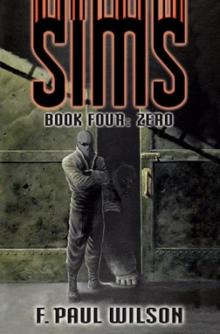 Ground Zero
Ground Zero Short Stories
Short Stories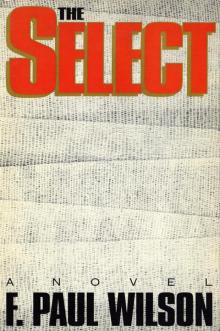 The Select
The Select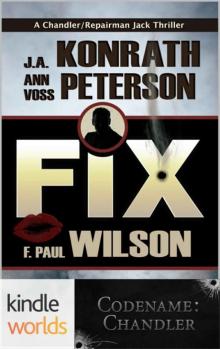 Codename
Codename Bloodline
Bloodline A Soft Barren Aftershock
A Soft Barren Aftershock The Tomb
The Tomb The Complete LaNague
The Complete LaNague The Tery
The Tery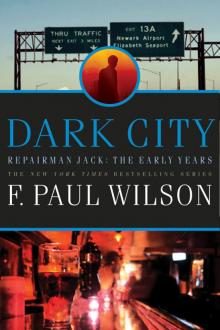 Dark City
Dark City Deep as the Marrow
Deep as the Marrow The Fifth Harmonic
The Fifth Harmonic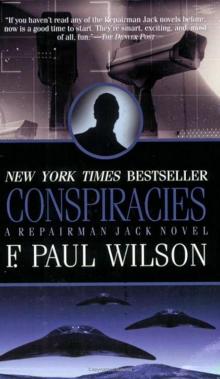 Conspiracies
Conspiracies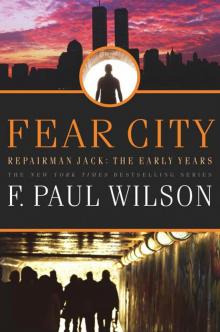 Fear City
Fear City Wheels Within Wheels
Wheels Within Wheels Wayward Pines
Wayward Pines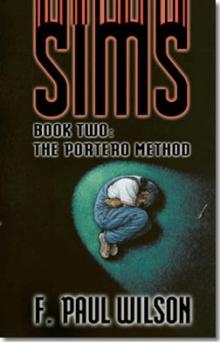 The Portero Method
The Portero Method All the Rage
All the Rage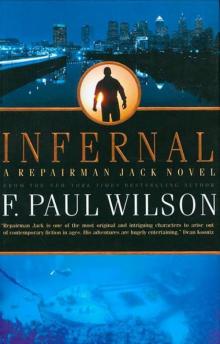 Infernal
Infernal The Barrens & Others
The Barrens & Others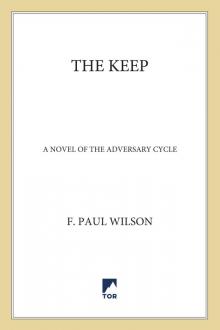 The Keep
The Keep Quick Fixes: Tales of Repairman Jack
Quick Fixes: Tales of Repairman Jack Virgin
Virgin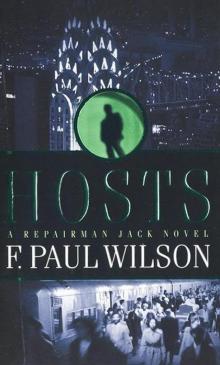 Hosts
Hosts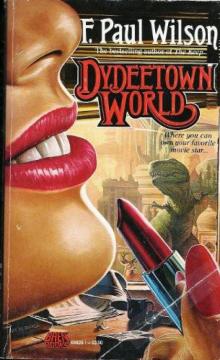 Dydeetown World
Dydeetown World Midnight Mass
Midnight Mass Black Wind
Black Wind The Christmas Thingy
The Christmas Thingy The Last Rakosh
The Last Rakosh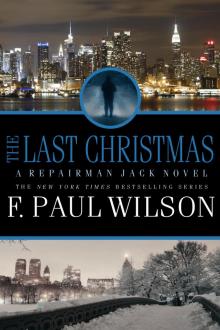 The Last Christmas: A Repairman Jack Novel
The Last Christmas: A Repairman Jack Novel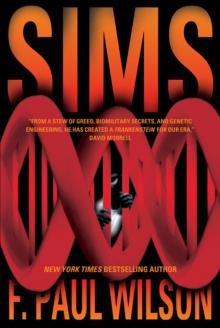 SIMS
SIMS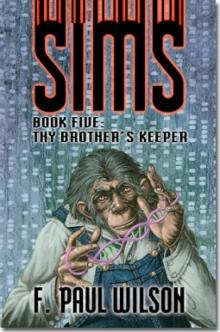 Thy Brother's Keeper
Thy Brother's Keeper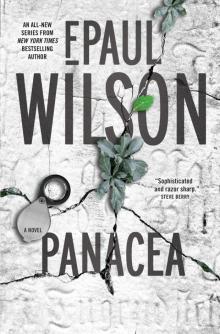 Panacea
Panacea The Touch
The Touch Scenes from the Secret History
Scenes from the Secret History Scenes From the Secret History (The Secret History of the World)
Scenes From the Secret History (The Secret History of the World)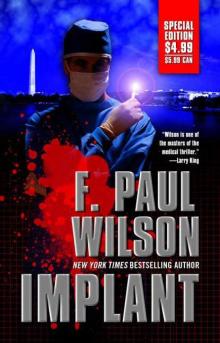 Implant
Implant The Dark at the End
The Dark at the End Fatal Error
Fatal Error Wardenclyffe
Wardenclyffe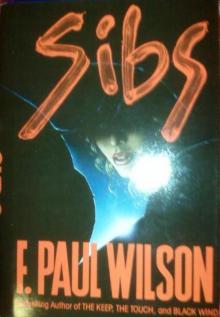 Sibs
Sibs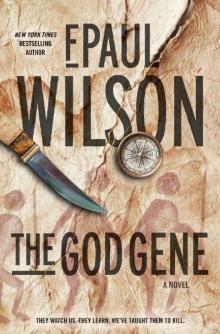 The God Gene
The God Gene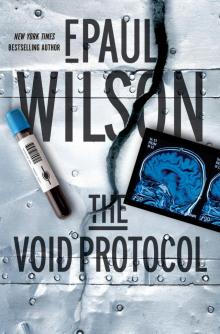 The Void Protocol
The Void Protocol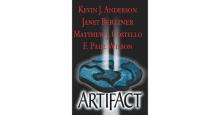 Artifact
Artifact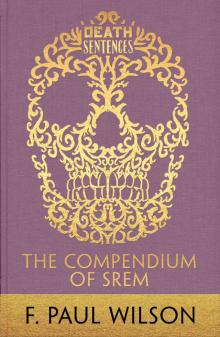 The Compendium of Srem
The Compendium of Srem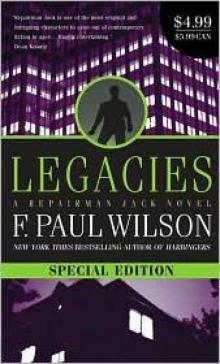 Legacies
Legacies Reprisal
Reprisal Jack: Secret Vengeance
Jack: Secret Vengeance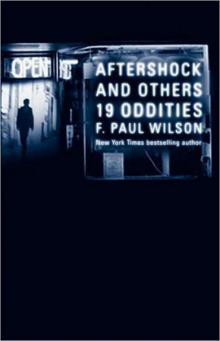 Aftershock & Others: 19 Oddities
Aftershock & Others: 19 Oddities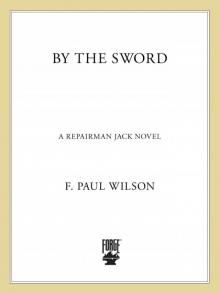 By the Sword
By the Sword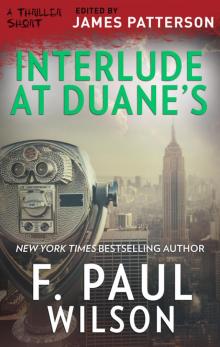 Interlude at Duane's (Thriller: Stories to Keep You Up All Night)
Interlude at Duane's (Thriller: Stories to Keep You Up All Night)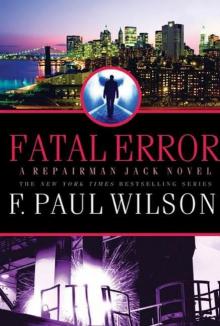 Fatal Error rj-13
Fatal Error rj-13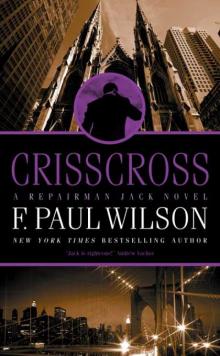 Crisscross rj-8
Crisscross rj-8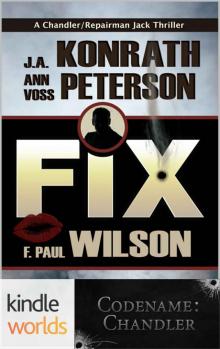 Codename: Chandler: Fix (Kindle Worlds Novella)
Codename: Chandler: Fix (Kindle Worlds Novella)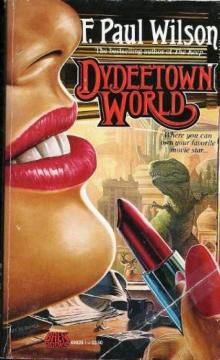 Dydeetown World lf-4
Dydeetown World lf-4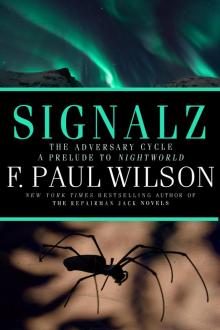 Signalz
Signalz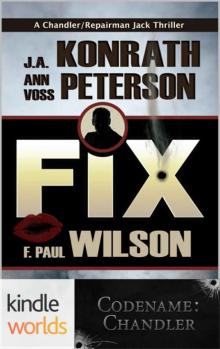 Codename_Chandler_Fix
Codename_Chandler_Fix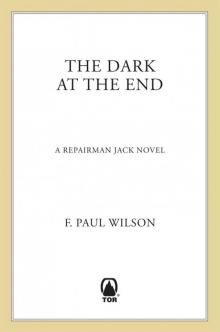 The Dark at the End (Repairman Jack)
The Dark at the End (Repairman Jack) The Complete Adversary Cycle: The Keep, the Tomb, the Touch, Reborn, Reprisal, Nightworld (Adversary Cycle/Repairman Jack)
The Complete Adversary Cycle: The Keep, the Tomb, the Touch, Reborn, Reprisal, Nightworld (Adversary Cycle/Repairman Jack)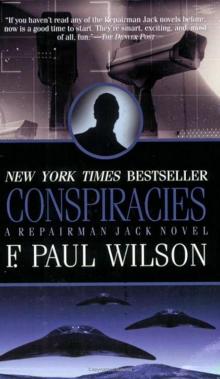 Repairman Jack 03 - Conspiracies
Repairman Jack 03 - Conspiracies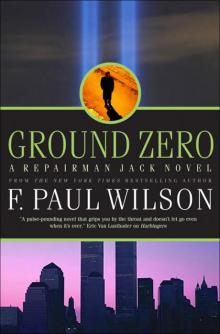 Ground Zero rj-13
Ground Zero rj-13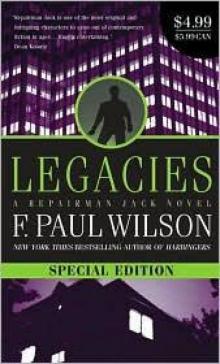 Repairman Jack 02 - Legacies
Repairman Jack 02 - Legacies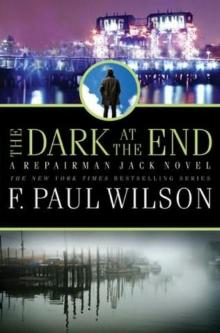 The Dark at the End rj-15
The Dark at the End rj-15![Repairman Jack [02]-Legacies Read online](http://i1.bookreadfree.com/i/03/21/repairman_jack_02-legacies_preview.jpg) Repairman Jack [02]-Legacies
Repairman Jack [02]-Legacies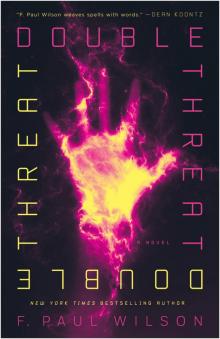 Double Threat
Double Threat The Tery lf-5
The Tery lf-5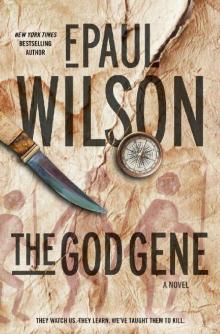 The God Gene: A Novel
The God Gene: A Novel Wayward Pines: The Widow Lindley (Kindle Worlds Novella)
Wayward Pines: The Widow Lindley (Kindle Worlds Novella)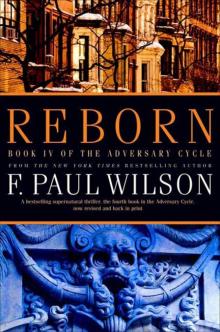 Reborn ac-4
Reborn ac-4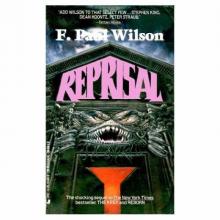 Reprisal ac-5
Reprisal ac-5 New Title 1
New Title 1 Healer lf-3
Healer lf-3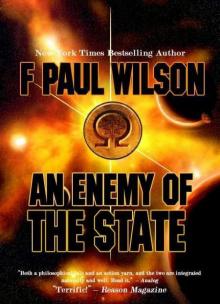 An Enemy of the State lf-1
An Enemy of the State lf-1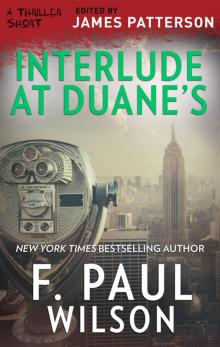 Interlude at Duane's
Interlude at Duane's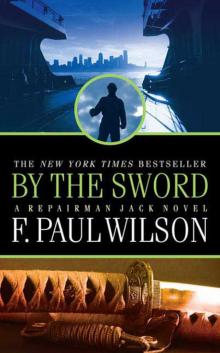 By the Sword rj-12
By the Sword rj-12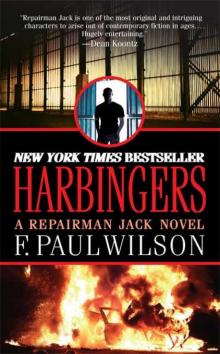 Hardbingers rj-10
Hardbingers rj-10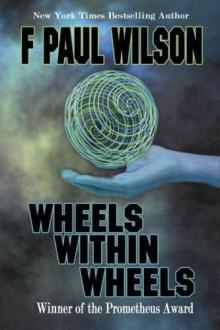 Wheels Within Wheels lf-2
Wheels Within Wheels lf-2 Jack: Secret Circles
Jack: Secret Circles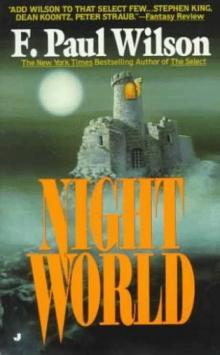 Nightworld ac-6
Nightworld ac-6 Quick Fixes - tales of Repairman Jack
Quick Fixes - tales of Repairman Jack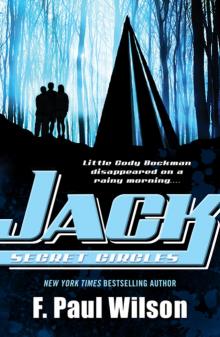 Secret Circles yrj-2
Secret Circles yrj-2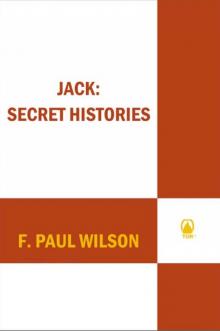 Jack: Secret Histories
Jack: Secret Histories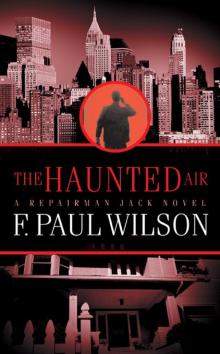 Haunted Air rj-6
Haunted Air rj-6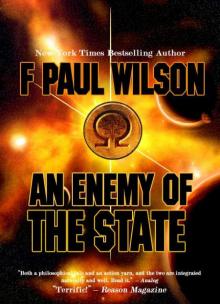 An Enemy of the State - a novel of the LaNague Federation (The LaNague Federation Series)
An Enemy of the State - a novel of the LaNague Federation (The LaNague Federation Series)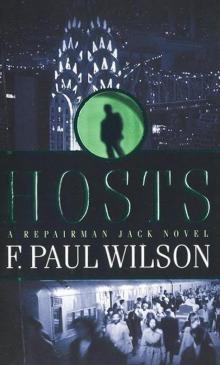 Repairman Jack 05 - Hosts
Repairman Jack 05 - Hosts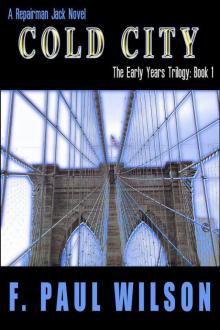 Cold City (Repairman Jack - the Early Years Trilogy)
Cold City (Repairman Jack - the Early Years Trilogy) The Peabody-Ozymandias Traveling Circus & Oddity Emporium
The Peabody-Ozymandias Traveling Circus & Oddity Emporium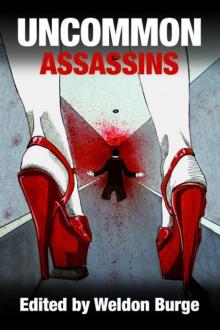 Uncommon Assassins
Uncommon Assassins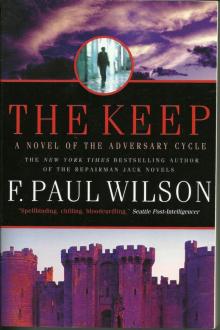 Adversary Cycle 01 - The Keep
Adversary Cycle 01 - The Keep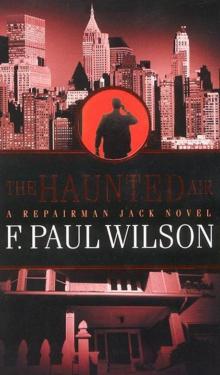 Repairman Jack 06 - The Haunted Air
Repairman Jack 06 - The Haunted Air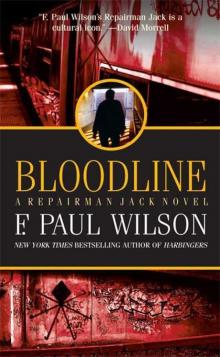 Bloodline rj-11
Bloodline rj-11 Ultimate Supernatural Horror Box Set
Ultimate Supernatural Horror Box Set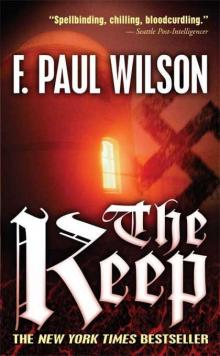 The Keep ac-1
The Keep ac-1 Repairman Jack 04 - All the Rage
Repairman Jack 04 - All the Rage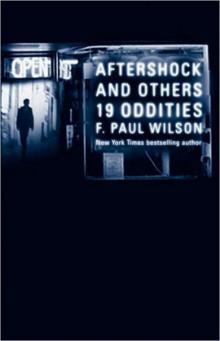 Aftershock & Others
Aftershock & Others All the Rage rj-4
All the Rage rj-4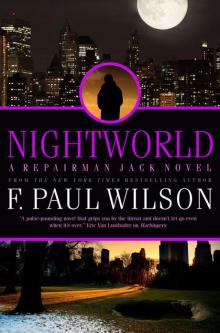 Nightworld (Adversary Cycle/Repairman Jack)
Nightworld (Adversary Cycle/Repairman Jack)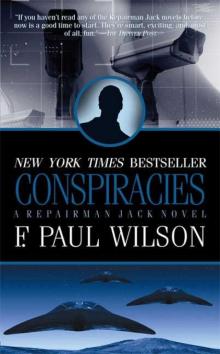 Conspircaies rj-3
Conspircaies rj-3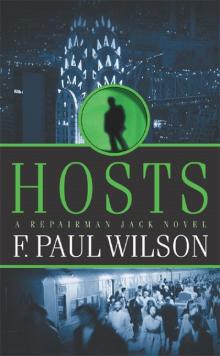 Hosts rj-5
Hosts rj-5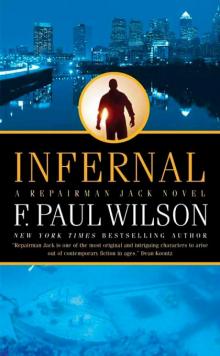 Infernal rj-9
Infernal rj-9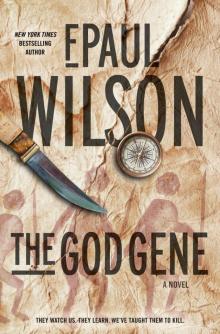 The God Gene: A Novel (The ICE Sequence)
The God Gene: A Novel (The ICE Sequence)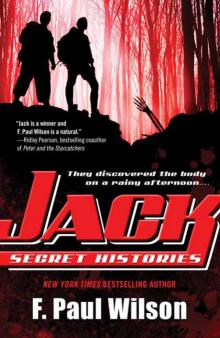 Secret Histories yrj-1
Secret Histories yrj-1